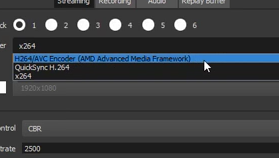
PLEASE NOTE THAT LAPTOPS WITH NVIDIA OPTIMUS MIGHT NOT WORK WITH THIS METHOD. It is all CPU oriented although I will cover explanations for iGPU's which uses h264 and might be better to minimize performance impact if you haven't done it already compared dGPU's h264. If you've come here and intend to still use h264, this guide is not for you. That all being said, I will guide you into why OBS is the software to go with x264, regardless of the current offering of today. It is still possible to bypass a lot of flaws it has, including not being able to record Vulkan or DX12. It's the ultimate platform for today's standard, even with it's lack of the most recent API's in which it might get updated soon to support officially. OBS itself, as a "free" software, it also features itself into so >many< options, you just can't go wrong with it. Well, at least it seemed like it would be that way, but thankfully. It seemed all hopeless that their would ever be a reliable solution.

ReLive isn't up to the task, just like Shadowplay at higher framerates the impact gets more and more noticeable, plus adding to the fact SLI and Crossfire setups don't really enjoy having their h264/h265 dedicated encoder's used while both rendering frames. With the release of ReLive on AMD, I was very intrigued to see if it could provide a better solution than OBS, Action!, Shadowplay or anything in general, but in terms of a power user like me.


 0 kommentar(er)
0 kommentar(er)
